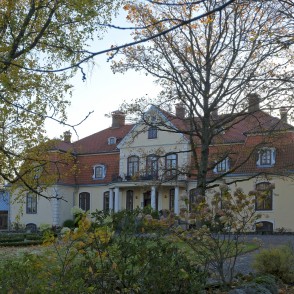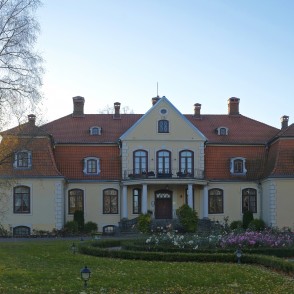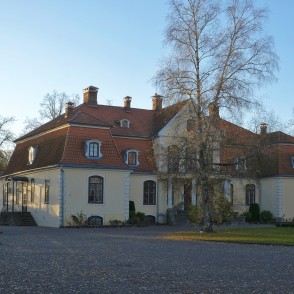LIEPUPE MANOR
Salacgriva district, Liepupe parish, Liepupe, P.O. LV-4023
Reservations
+371 278 028 01
Event organisation
+371 263 828 99
Hotel, restaurant (in working hours)
+371 64 020 268
info@liepupesmuiza.lv
rezervacija@liepupesmuiza.lv
www.liepupesmuiza.lv
Hotel Liepupe Manor is set in a beautiful, 18th century manor complex surrounded by a park and it offers accommodation in 2 buildings – the Manor house and the Stewards (White) house.
There are 16 majestic rooms at the Liepupe manor. Manor house has ten double rooms – Standard, Superior, Deluxe class . The rooms come with wooden hearths; the wood basket is refilled daily. The Suites have ceilings decorated in ornate restored moulds, and they provide an exceptional view.
Liepupe Manor's restaurant is located in the large hall of the manor` main house. The concept of this restaurant tastefully combines the sophistication of fine contemporary urban cuisine with the traditions of rural cooking, altering its menu with every season and using fresh, locally-grown ingredients.
Fresh produce comes from the local farmers, while herbs and spices are cultivated in the manor's ecological garden.
www.latvia.travel
History
The creator of the architectural solution of the Liepupe manor was Riga mason, Johan Andreas Haberland, the father of the famous Christoph Haberland. The manor’s history is linked to the von Meck family and, the less well-known von Sanger family.
In the first half of the 18th century, the effort of commencing and finalising the building of the exquisite Liepupe manor was undertaken by Friedrich Wilhelm von Meck’s widow, Anna Sofia (maiden name von Dunten) and their son, Georg Friedrich, who returned to Liepupe from his army service and put to use his experience with the architectural and interior design solutions in Saxony. Following the sudden death of Georg Friedrich, the estate was inherited by his brother Johann Gotthard, whose son Burhard Friedrich would later share heart-to-heart discussions with Latvian writer Garlieb Merkel. In his memoirs, Merkel described his friend Friedrich as follows: due to his eminent intelligence and knowledge, he became so famous in Jena and Konigsberg that, for several years after his return home, he continued corresponding with philosopher Rheinhold in Jena, Krause in Konigsberg – and even Kant. In 1794, Friedrich suffered inflammation of the brain and died at the young age of 25. Five years after him, his grief-stricken mother also left this world. The property was inherited by Friedrich’s younger brother Georg Christoph, who restored a bohemian atmosphere to the Liepupe estate, living beyond his means. In the 1820s, Georg Christoph left for St. Petersburg together with his family, taking the estate archives with him.
The estate was purchased by the von Sanger family in 1829, who remained in charge until 1922. In the 30s, a school for farm hands was established on the estate, which was active up until World War II. The former owner of the estate, Friedrich Sanger, was successfully engaged in the shipping industry and would often stay in Liepupe. The Liepupe buildings did not suffer damage during the war, although the surrounding landscape lost its beautiful trees, which were once found in the estate park as well as an entire alley lined with chestnut trees.
After the war, the centre of the Liepupe sovkhoz (Soviet collective farm) – including an office, a library and a club – was established inside the manor. During Soviet times, the building was looked after and maintained in good condition. The estate remained unduly abandoned and unused for much of the recent past, until, in late 2004, its fate was in the nurturing hands of Egita Lauska. Although the appearance of the manor has changed, time has treated it well, and the overall composition has remained well-preserved. This is clear to anyone who takes the time to enjoy the peculiar historical ambience of the Liepupe estate.
www.liepupesmuiza.lv




